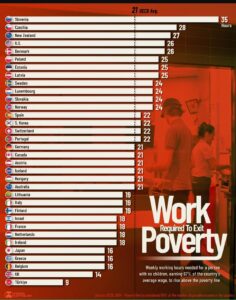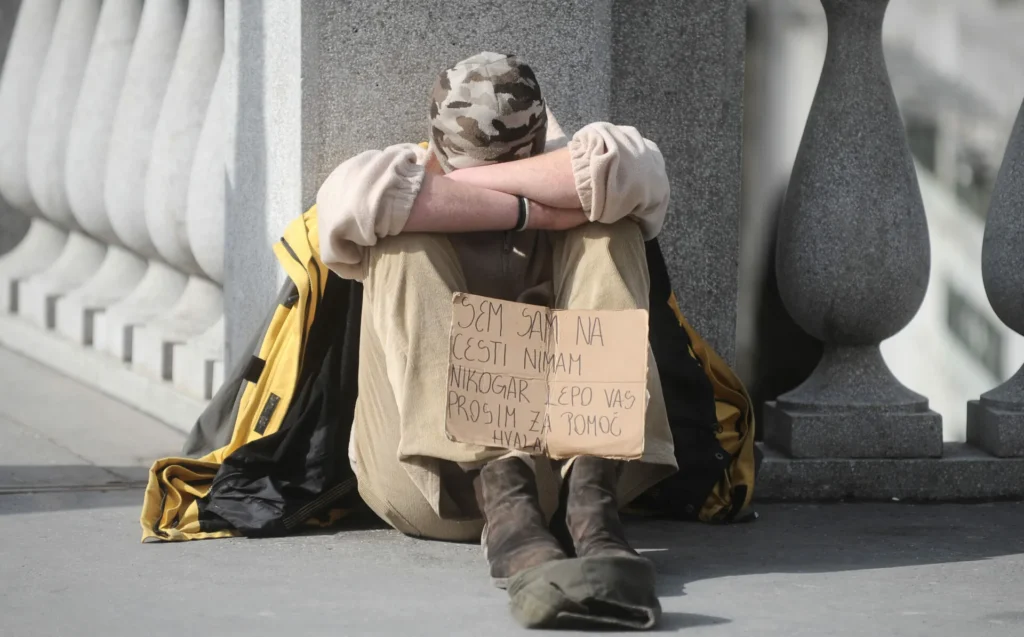Three years of Golob’s far-left government have left scars on Slovenia that will not be healed for generations. In an already egalitarian society, the coalition has introduced even more socialist levelling. Every day, we read about a new parameter that shows how far we have sunk. One of these is the OECD’s scale recording the number of hours a week that the average person has to work to break out of the grip of poverty.
On average, in OECD countries, a single low-paid worker (without children) needs to work 21 hours a week to rise above the poverty line. Slovenia is almost twice as bad as this average. A Slovenian needs 35 hours of work a week to stay out of poverty, which is more than any other OECD country.
Turkey needs only 9 hours of work a week to rise above the poverty line. Realistic wages, employment conditions and economic opportunities affect how easily ordinary people can escape poverty. That is why getting above the poverty line requires much more work in some countries than in others, including, as already said, among OECD countries – and most work is required in Slovenia.

The infographic uses OECD data to show the weekly hours a single person (without children) needs to work to rise above the poverty line in 35 OECD countries, assuming they earn 67 percent of the national average wage. The poverty line is calculated as 50 percent of the median disposable income in the country. In terms of Slovenia, this means that it is almost impossible for a person earning the minimum wage and a little above to rise above the poverty line in Slovenia, with the additional problem of high wage compression, where most wages are concentrated below the average and much closer to the minimum than to the average wage. We can therefore conclude that Slovenia is a country of the poor, where poverty is the result of institutional factors.
Slovenia stands out from the average because a worker needs to work 35 hours a week – almost the equivalent of a full-time job – just to break the poverty line.
What went wrong?
So, Slovenia, a country where we like to boast about our marked egalitarianism, is a prison for the poor. It is virtually impossible to escape from Slovenian poverty. Why is this happening?
For the same reason that the diametrically opposed measures (to the ones of the Golob government) that are being implemented in Argentina have had diametrically opposed effects to those in Slovenia. Argentina has opened up to foreign investment, deregulated and de-bureaucratised its systems, drastically cut taxes and curbed public spending. The results are stunning – the country has tamed hyperinflation in record time, the economy is growing again after a long time, public debt is falling, and so is real poverty.
On the other hand, the Golob government has completely isolated the market for foreign investment, increased taxes (especially on wages) and made an already uncompetitive tax environment even more unattractive for foreign investment. Every day, there is more red tape, every day, we are passing new regulatory legislation that interprets already strict European Union directives in an even more restrictive way. Under the influence of the extremist Left party (Levica), the coalition has been at active war with the economy, employers and free enterprise in general for three years now. In such an environment, grass does not grow. We live in a country that would like to be self-sufficient in its isolated reality, where corruption and nepotism flourish, but lives in a global world where things simply do not work without cooperation and openness.
The Slovenian economy is admirably fighting against the harmful measures of the government, but in the end, the furrows of egalitarianism do show. As with the climate transition, which the government is also forcing and thus sabotaging the economy, it is the most vulnerable or the poorest who are the first to experience the harsh consequences of the above. The Slovenian worker who earns minimum wage, therefore, no longer belongs anywhere near the European Union, but instead, deep in the Balkans.
I. K.


